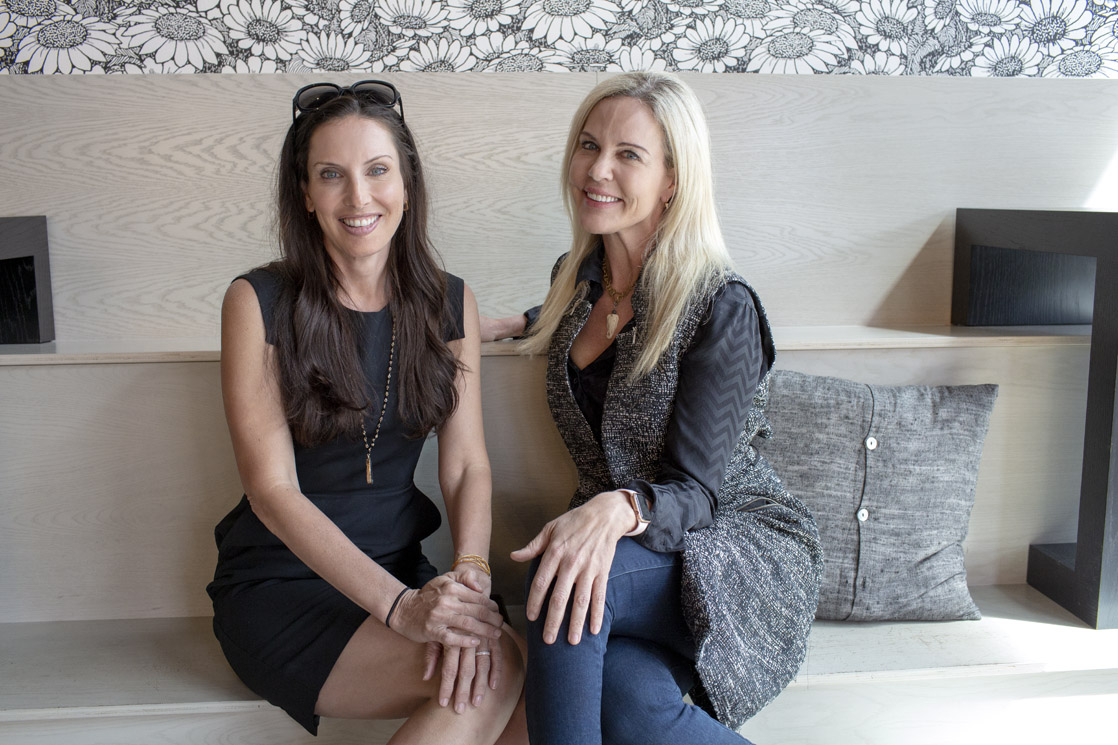Coffee Break with Deviree Vallejo & Liz Richards
If you don’t know Deviree Vallejo and Liz Richards of LIV Sotheby's International Realty, you should. The two are totally crushing it! In fact, they were named the number one (Deviree) and number two (Liz) top producing agents in metro Denver at this year’s Excellence Awards.... now that’s a big deal. So, naturally we wanted to sit down with the two to learn more about them and their business, and to ask the question everyone is wondering: how did they do it? Read on to find out.
DMAR: Can you tell us a little bit about yourself and how you got into real estate?
Deviree: Liz, you go first.
Liz: I got into real estate in 2004, and... (laughs). I have severe jet lag. This is not going to go well.
Deviree: Maybe I should talk first. Why don't you think and I'll talk? So I got into real estate in 2003 and I originally got licensed to get into commercial real estate, but at the time the commercial market was in the toilet. My college roommate was working for a brokerage at the time and she was like, "Oh, why don't you come team up with me?" Honestly, I had nothing better to do, and no other options, so I went and joined her and we became a team. We stayed a team for maybe a year, and then she got out of the business and opened up a dog grooming salon, which has actually been pretty amazing for her… But that's how I got into real estate. I had had a variety of sales jobs before, none of which I was very good at, because I'm not really a salesperson. But real estate is great because I don't look at it as sales or selling, it's advising and it's a relationship.
Liz: Oh, yeah, now I remember. I, too, had had a variety of sales jobs and was in the corporate world. It was not a good fit as I don't like to be confined. I like the entrepreneurial nature of being in real estate. After becoming disengaged in the corporate world, I thought about becoming a school teacher. I was taking some classes to get my masters in teaching and quickly realized that that wasn't going to be a good fit. I was dating an architect at the time and ended up marrying him, and the most positive thing that came out of that was him saying to me, "Why don't you get into real estate? You love design, you love architecture, you're good at sales…" and so I went and got a little part-time job at a firm just to see what it was like. The first day, I'm like, "I could totally do this!" and I quickly got my license. The cool thing was that literally the day after I got my license, one of my friends who had been looking for a house for about three years said to me, "If you're licensed and I haven't found a house yet, you're my gal." Well, I didn't depend on that, but I wrote a contract the day I got my license for a house in Wash Park, which was really cool... that’s basically how I became a REALTOR®. I was at a small firm at the beginning, and then I went over to Kentwood City and now I'm at LIV Sotheby's.

DMAR: How have you both seen the Denver market change, and where do you think Denver is going?
Liz: I think that the amazing part about our market is that we're so well positioned in the national marketplace in that we're always going to be attractive to people from the East and West coasts. We're always going to be less expensive than New York City, San Fran and LA and we have a lot of people coming from those markets who want still want a cool lifestyle and quality of life, but they're sick of the crazy prices in those cities. I call us the “Goldilocks Market" - we're just right. And I don't think that will ever go away with any of the ups and downs. We've done the correct infrastructure as far as our food scene, our art scene, our transportation and we've got the outdoors. All these amazing things that are going to attract people to us versus somewhere else. I think at this point we are the most impressive non-coastal city, the most successful non-coastal city and I think that will forever be how it is. I don't see that drastically changing.
I do think that we're going to have a softening. I mean we've been on this seven, eight-year ride of upswing, and that just doesn't continue. I feel lucky, and I think Dev feels the same, that we both were REALTORS® during 2008, and we realize that there's fluctuations and market corrections. I think we'll have some corrections. I don't think we're going to have a downward spiral, but I think we're going to have a softening… and there's always good and bad to a softening. I felt like in 2008, when the market got really tough, REALTORS® were almost valued more. The discount brokers and part-timers went away, and people really wanted a professional and someone with experience.
TWEET THIS: "I felt like in 2008, when the market got really tough, REALTORS® were almost valued more. The discount brokers and part-timers went away, and people really wanted a professional and someone with experience." 

Deviree: I agree. We're not going to have a huge downturn like we did. All of our clients are asking, “Is it going to fall apart like it did in 2008?” But we're in a completely different place ... that was a lending problem. We're in a different set of economic circumstances, but I do think that it's going to soften. I think it has softened a little bit, I mean inventory is up. But with that buyers have more choices, so it's not a bad thing.
Liz: A balanced market is a good thing, gives people a little time.
Deviree: The fundamentals of Denver will keep it popular and hot. People are going to still be moving here. I know a lot economic forecasters are expecting a little bit of a dip in 2020, and it being an election year it'll be interesting to see what happens. But we're not terribly worried.
DMAR: Is it hard to work with sellers right now who still have expectations based on what the market was like last year?
Deviree: Yes, it is, because sellers still think they should have multiple offers the first weekend their home hits the market. You get multiple offers if you're priced right at, or below, market. Pricing is critical and a lot of sellers have unrealistic views of what their home is worth. And if you break down the Denver market into sub markets and look at a specific area to see how much homes there have appreciated year over year from last year, it’s usually very little. But what happens is a seller reads something saying that the Denver market is up 10 percent from last year and they just assume their house is worth 10 percent more, which isn't necessarily the case depending on the submarket they're in. I feel like we're actually working harder with sellers because now we're having to educate and work with them on pricing, which when they have an expectation set in their head, and you have something that's different than their expectation, it can definitely be a source of frustration. So it's been a little bit more challenging.
Liz: So many sellers, especially right now, think that their house is an "honor student" or that they've got the gifted house. It's a challenge, it's always been a challenge, and everyone thinks their house is the exception to the rule. Setting a price right now is really hard for sellers... they've just got pie in the sky ideas.
DMAR: What is your working relationship? Are you guys a team?
Deviree: We're not a team. Liz has some clients that she just lists - she'll list the projects without me if they're smaller - and I have some clients that I'll list without her. We sell individually because a huge portion of our business is resale, but we also have a new construction niche that has grown as we've established relationships with developers over the last decade. For projects, if they get to 10 units or above, we always co-list. It's just easier to manage - that way if one person goes out of town or whatnot then you have the other one to help. There's a lot of behind the scenes work so having that other person is great.
Liz: It's been a great collaboration because it's 24/7 business. With the personalities of developers, I think it helps to have two people. We play good cop, bad cop and kind of switch those roles around and that's super helpful. Developers can be a lot to handle so it's great to have a collaborator. And it's more fun. I think it's helped us obtain more market share, as well, by working together - there's power in collaborating.
Deviree: And it's also a good balance of our strengths and weaknesses. For the most part, Liz is much more of a creative and into design and she has great marketing ideas. I'm more into numbers and making sure things make sense. We have a lot of the same skill sets, but we think differently and so the way that we operate is a nice balance.
DMAR: What kind of support people do you have helping you?
Deviree: My mentor always told me, the day she got into real estate, she had a full-time assistant. And I think that's really important, especially for younger agents. There's so much side work and background stuff that you have to do in real estate other than sales. If you're spending the majority of your day doing that, you're never going to get any sales. So we each have a full-time assistant and then we've got a marketing person and a second assistant. We call her “Runaround Sue” because she runs around and drops off lockboxes and hangs up banners, and just random stuff, quite honestly.
Liz: A good support team is crucial. You can spend half your day setting a lockbox or running around doing brochures, but you're better off doing the stuff that brings in the business and makes you money and subbing that other stuff out.

DMAR: So we of course want to extend a huge congratulations to your recent success at the Excellence Award for being named the number one and number two top producing agents. So I think the question on everyone’s minds is, how did you do it?
Deviree: So this is a true story. I remember being in the Ritz Carlton downtown a decade ago or more, and at the time they would put the top 10 on stage. I remember sitting there, looking up and thinking, "I'm going to be number one someday." Everything in me believed that. I didn't have any self-doubt. I think maybe life coaching helped that. But I truly believed it. I think if you 100% believe something, whether you're cognizant of it or not, your actions get you to that point. So you may not even realize the things that you're doing or be aware of them, but your belief deep down is what it is and you're going to do things to reinforce that belief. I think having a great life coach, having business coaches, having people help you along the way is critical, too. Sotheby's is huge on ninja selling and I was always kind of like, "Eh, not into that." But even now I see ... One of the big things they have you do is write affirmations and I see a huge benefit to that. Totally makes sense, and it works.
TWEET THIS: "I think if you 100% believe something, whether you're cognizant of it or not, your actions get you to that point." 

Liz: I've always been very goal-focused, and a believer in writing out my game plan and my aspirations. My mom actually just put together this cool present for me for my last birthday; it had old papers and things from my childhood. And I found something from when I was maybe 11 years old, and I'm like, "It's the eve of the new year and this is what I plan to do.” (laughs) It was so dramatic, but really I've always been very much into setting an intention and focusing on it. I believe in the power of writing things down and being very detailed. So I, too, remember when I first got into real estate being at the awards and seeing these people who were doing $30 million at the time and being like, "Holy shit, I want to do that." You know? And every year going to the awards and just being like, “You know what? I want to do that.” I think it's about staying focused and having a hard work ethic and tenacity.
DMAR: Did you guys already know your ranking or were you surprised at all?
Deviree: We knew we were high because there are numbers in the MLS. So you kind of know who's doing what. We didn't know for sure we'd be as high as we were, but we knew we were up there.
DMAR: The top five were all women this year.
Deviree: Denver is a female-dominated market, which is rare. Usually, most major markets are male-dominated, so we're just like a female city - which to me is interesting.
DMAR: What would you say to new or younger agents who are now sitting in the crowd seeing people like you and thinking they want to do that, too?
Deviree: Patience is key. We get a lot of new agents who just get frustrated, and patience is so, so, so important. I mean Liz and I have a similar background as to how we started... basically, we had nothing. I had no money - I think I had $100 in my bank account. I couldn't afford signs. I was single. I lived in a crappy little apartment. I couldn't afford groceries. I mean it was literally like month to month in terms of being able to pay my rent, and for the first two to three years I struggled. You see new agents come in and they get frustrated after six months because they haven't gotten to where they want to be - but six months is nothing! It takes a long time if you're starting from zero to get to a point where you don't have to worry about where your next closing is coming from. You have to stick with it. You have to be patient otherwise you just won't make it. People get frustrated, they give up and they move onto something else. But listen, everything you put out there will come back to you. So, even if you're sitting at an open house, maybe six weeks in a row, and you think you get nothing out of it, two months later you'll get a call and it'll be someone who you met at an open house and now they're ready to buy. You just never know.
Liz: I think it's important to piggy-back on that. You have to have good habits, you know? You have to do the basics. You have to have follow-up meetings. I'm really good at having my systems and putting it in; when I meet people I always follow up. It’s all about the power of staying in touch. People go dark all the time. We all get ghosted. But you can’t give up on that or take it personally. The key is just staying consistent. I can't tell you how many people that I think, “Wow, they just went away,” or “they bought with someone else,” and then they come back. I'm always keeping in touch with them, and then they're just ready. Again, I think it’s all about not getting discouraged and just keeping that high activity up and being consistent.
TWEET THIS: "People go dark all the time. We all get ghosted. But you can’t give up on that or take it personally." 
Deviree: Another thing that's huge is surrounding yourself with people who are better than you. When we went to Kentwood, I'll never forget sitting in the sales meeting for the first time and being so intimidated. You go over the production for the week and they show everything that everyone is doing… I felt like a loser. And I was like, “I’ve got to step it up because these people are kicking ass.” I think certain people will rise to the occasion and get inspired by it like we did, and then other people get intimidated and just bow out. But to me, you are the sum of the people who surround you, so if you're surrounded by amazing people it's only going to make you better. And sure, you get intimidated, but at the end of the day it's a huge benefit to you. I love being around the agents at our office now because they're awesome and they're all big producers.
Liz: One of my favorite sayings is, "you become the average of who you surround yourself with." Energy is contagious and I'd rather be the little fish in the big sea than the big fish in the little sea. That's the important thing: you’ve got to just keep pushing yourself and raising the bar. if that's what you want. You just can't get complacent.
DMAR: How long have you both been members of a REALTOR® Association? Do you think your membership has helped your careers?
Liz: To be honest, I don’t think I have taken full advantage of it, but it's a great network. Part of our success has come from that fact that we really value other REALTORS® and try to have really good relationships with them. It's important that if someone sees my name pop-up on the phone they're not thinking, “Ugh she's a train wreck,” you know? They see my name and they know that they're going to work with someone professional, and I'm going to get shit done and I'm going to be on point. It was cool to be at DMAR’s Excellence Awards this year and just see all the same people who we've been working with, especially now that we've been in the business for so long. I definitely see value in those relationships.
Deviree: I think it's great for younger agents too like I know the Young Professionals Network is super active. We've invited them - in fact, we did this week - to project launches and they show up and they're super supportive. And again, it's just great networking. One of the things I always say in my listing presentations is how important it is to have a good broker network, so just to have that connection with other brokers is huge. If you're in a competing offer situation and you're the listing agent and you have five offers, you want to go with someone you know because you know the deal is going to get done. And the classes the Association offers are a benefit, too. Let's face it, it's hard to get training when you start in this business. So the training and professional development classes that DMAR offers are amazing. I always read those emails when they come through.

DMAR: Do you agree that working in real estate you have to create a brand around yourself?
Liz: I think the answer is yes. People work with you because of what you're going to do differently, or how they feel they're going to be taken care of. With me, they know that I'm going to work hard, I'm going to be highly responsive, there's not going be any bullshit and I'm not going to try to sell them something. You know? I'm going to be honest and tell them if their place is overpriced, or if something needs to happen. And I'm also going to be as aggressive as possible to get something done.
Our business is so referral-based, so we only get business by taking really good care of people, and that's always my number one. I always say I don't want people to buy or make any decisions that I wouldn't make for myself. I take ownership and I guide them as if it were my money. That goes a long way. I think with both of us there's a huge sincerity factor, and they see that we're in it for the long haul and that we really, really care. With marketing, there's always the shiny new thing so we're constantly trying to be innovative and progressive, and not stay stagnant or do what we did 10 years ago. At the end of the day, the true fundamentals are really what drive your business.
Deviree: I agree. I think a brand is really important. A perfect example is how important it is that you show up and dress nicely for work. If you want to attract higher-end clients it's important to dress nicely. It's just part of the whole package. And that applies to any business, really. If someone shows up to a meeting in a tracksuit you’re probably going to question their credibility. You know, going along with what Liz said in terms of being in business for 15 years, you have a reputation. So the referrals that I get, most people comment that they refer me because I'm not just in it for the sale. I don’t have commission breath. I'm truly looking out for their best interest. This is one of the most important values in this business: as long as you are looking out for your client's best interest I feel like your business will always grow. I talk people out of deals or transactions all the time because I don't think it's the right fit, or I think it's a bad investment and in the long run, people appreciate that. And it rewards you. I'm very honest with what I think about a property and I'll say, “Sorry but you can't buy this house, it's falling apart,” versus just saying, “Oh my god, look there’s this shiny new kitchen.” I can tell if a kitchen is put together poorly and it's cheap, and if the kitchen's cheap then there's probably a lot of other problems in the house that you can't see. So it's just things like that.
TWEET THIS: "I don’t have commission breath. I'm truly looking out for their best interest." 



